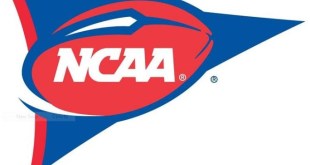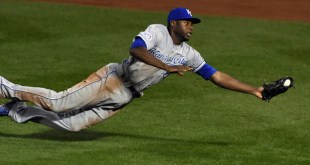Tweet
It finally happened. After beating around the bush for years – including multiple lawsuits against the City of Chicago and the Commission on Chicago Landmarks – a group of owners[i] that operate the rooftop seating clubs on the buildings behind Wrigley Field (the “Rooftop Owners”) sued the Chicago Cubs and chairman Tim Rickets in the Northern District of Illinois. The Rooftop Owners allege a number of claims stemming from the Cubs’ ongoing, Wrigley Field “expansion” project.
But before diving in, I think it’s important to take a moment to say a few words about the late Ernie Banks, a man whose personality starkly juxtaposes the money-motivated nature of this litigation. The selfless Banks passed away on January 23, a mere three days after the Rooftop owners’ lawsuit against the Cubs was filed. Not only was “Mr. Cub,” as he was affectionately known, a Hall of Fame baseball player and the first African-American to play for the Cubs, but he was more importantly a man who embodied what baseball is all about: the love of the game. Rather than me doing a poor job of waxing poetic, a particularly poignant passage from one of my favorite authors, Bill Bryson, in his book The Life and Times of the Thunderbolt Kid, sums Banks’ impact on baseball and others perfectly:
Once on a hot July afternoon I sat in a nearly airless clubhouse under the left-field grandstand at Wrigley Field beside Ernie Banks, the Cubs’ great shortstop, as he autographed boxes of new white baseballs (which are, incidentally, one of the most pleasurably aromatic things on earth, and worth spending time around anyway). Unbidden, I took it upon myself to sit beside him and pass him each new ball. This slowed the process considerably, but he gave a little smile each time and said thank you as if I had done him quite a favor. He was the nicest human being I have ever met. It was like being friends with God.
With Banks’ memory still heavy in the hearts of Chicagoans, what promises to be an ugly dispute plays out across town at the federal courthouse. After the Ricketts family announced its $500-million, privately-funded plan to modernize historic Wrigley Field[ii] – which included constructing an adjacent hotel, installing new lighting, and, importantly, erecting outfield signs at the historic ballpark to accommodate extensive advertising that was never realized – I documented the history and contractual relationship between the Cubs and the owners of the rooftop buildings that sweep the panorama behind the Friendly Confines. I’ve also previously written about the rooftop owners’ recent indirect efforts to put a halt to the long-anticipated expansion project (which broke ground this offseason) by bringing suit against the City of Chicago and Commission on Chicago Landmarks. But this time, things are different. After years of posturing and failing to enjoin the team from beginning construction, the Rooftop Owners finally did the inevitable, suing the Cubs.[iii]
While the Complaint sets forth plenty of headline-grabbing allegations, the Rooftop Owners’ actual legal arguments rest on pretty shaky footing.
For example, allegations of “price-fixing” and “monopolization” (i.e. antitrust violations of the Sherman Act) certainly get top billing in the daily newspapers. In their Complaint, the Rooftop Owners allege that the Cubs have a 93 percent share of the market for live Cubs tickets, which amounts to an unlawful monopoly. This monopolization of the market, according to the Rooftop Owners, allows the team to fix ticket prices and drive its competitors out of business.[iv] What the lawsuit seems to ignore, however, is the fact that it’s arguable whether the Cubs and Rooftop Owners are even “competitors,” when they may in fact be construed as partners, given the contract between the two groups that authorizes the Rooftop Owners to profit from the product put on the field by the ball club.
Further, and more importantly, is the existence of baseball’s antitrust exemption. Over the course of nearly a century, the courts have consistently affirmed and re-affirmed a special exemption from the antitrust laws for the “business of providing public baseball games for profit between clubs of professional baseball.”[v] While the exemption is not a carte blanche to engage in anticompetitive behavior, it does insulate Major League Baseball’s clubs from allegations of certain types of antitrust claims. Assuming that ticket sales to live games at Wrigley Field fall under those concerning “the business of baseball,” the antitrust claims by the Rooftop Owners will likely fall under the exemption and be subject to dismissal.
By making the thrust of the Complaint about antitrust – as well as alleged improper business actions and statements by the Cubs – the Rooftop Owners appear to be avoiding the real issue underscoring the dispute: whether the “expansion” project by the team breaches the contract between the Cubs and the Rooftop Owners. Property owners traditionally do not have any legal right to an unobstructed view.[vi] As such, in the absence of a contract, there’s little permitting the owners of the buildings surrounding Wrigley Field from watching games[vii] or the Cubs from blocking those views. But, the 2004 agreement between the parties gave the rooftops some limited rights to an unobstructed view into the stadium, in exchange for monetary considerations.
As previously noted, the Cubs have a strong argument that the team did not breach that contract. While the language of the contract states that the Cubs agreed to “not erect windscreens or other barriers to obstruct the views of the Rooftop,” that same provision also provides that “Any expansion of Wrigley Field approved by governmental authorities shall not be a violation of this Agreement.”[viii] Though the Rooftop Owners will likely argue that the proposed scoreboards are not an “expansion” of the stadium, and thus still prohibited under the agreement, they will likely face an uphill legal argument, as the new signs are an integral part of the city-approved renovation plans.[ix]
In truth, the arguments on both sides are more nuanced than those detailed in the limited setting here. There will likely be voluminous briefing by both parties at the early stages of the litigation, so a resolution probably will not come quickly. But, given what’s at stake for the ball club,[x] should the lawsuit survive the dismissal stage, a settlement is the most likely outcome. If the lawsuit were to play out to conclusion, however, ultimately the Cubs would likely have success dismissing most, if not all, of the claims in the Rooftop Owners’ Complaint on the merits.[xi] Further, because the majority of the allegations in the new suit arise from the rooftops businesses’ relationship with the team under the 2004 agreement, the court may opt to dismiss the entire lawsuit and force the parties to resolve their differences through arbitration.[xii] Regardless, the long-standing Fight at the Friendly Confines may finally, mercifully be reaching a conclusion.
Update: On February 17, 2015, Ricketts and the Cubs filed a motion to dismiss the Rooftop Owners’ Complaint in its entirety. In their motion to dismiss, the team refutes the Rooftop Owners claims of anticompetitive behavior, citing baseball’s antitrust exemption and arguing that the Rooftop Owners cannot transform a “simple contract dispute into precedent-shattering antitrust claims.” The Cubs also defended their right to install outfield advertising and a video scoreboard because the “contract indisputably allows [the Cubs] to undertake the Wrigley Field expansion…”
Further, after the Rooftop Owners moved for a temporary restraining order (“TRO”) on February 12, 2015 to prevent the Cubs from proceeding with the present construction, the Cubs fired back in another motion opposing the TRO. The Cubs argue there is no emergency. They also argue that the rooftop businesses have known for more than a year about outfield signs that could obstruct their views and waited too long to file the emergency request. Since the first home game isn’t until April 5 there is no immediate threat to rooftop businesses, according to the opposition brief. A hearing on the restraining order was scheduled for 9 a.m. February 18 in federal court.
Update: On February 19, 2015, U.S. District Judge Virginia Kendall ruled that the “vague possibility” rooftop owners could be injured by the Cubs’ installation of the proposed signs and scoreboard wasn’t enough to issue a restraining order against the team.
[i] The named rooftop plaintiffs are as follows: Right Field Rooftops, LLC, d/b/a Skybox on Sheffield; Right Field Properties, LLC; 633 Rooftop Management, LLC, d/b/a Lakeview Baseball Club; and Rooftop Acquisition, LLC.
[ii] http://chicago.cubs.mlb.com/chc/restore-wrigley/
[iii] The Rooftop Owners’ latest suit alleges nine different counts against Ricketts and the Cubs: attempted monopolization in violation of the federal Sherman Act (Counts I and II); false and misleading commercial representations in violation of the federal Lanham Act (Count III); violations of the Illinois Uniform Deceptive Trade Practices Act (Count IV); violations of the Illinois Consumer Fraud and Deceptive Business Practices Act (Count V); defamation (Count VI); false light (Count VII); claim for injunctive relief (Count VIII); and finally, breach of contract (Count IX).
[iv] The stakes are further raised with antitrust allegations, as both treble damages and attorneys’ fees are available to a prevailing plaintiff.
[v] See Toolson v. New York Yankees, Inc., 346 U.S. 356 (1953), affirming the authority of Federal Baseball Club of Baltimore v. National League of Professional Baseball Clubs, 259 U.S. 200 (1922). Baseball’s antitrust exemption was most recently upheld by the Ninth Circuit in City of San Jose v. Office of the Commissioner of Baseball, which rejected San Jose’s antitrust lawsuit challenging Major League Baseball’s “attempt to stymie” the relocation of the Oakland Athletics to San Jose, California.
[vi] See Stephen Christopher Unger, Ancient Lights in Wrigleyville: An Argument for the Unobstructed View of a National Pastime, 38 Ind. L. Rev. 533 (2005).
[vii] So long as the building owners are not misappropriating the Cubs’ products or property by, for example, profiting from selling tickets to watch the live action on the field. The product for sale here — viewing of live Cubs games — is the Cubs’ core product they create and own. The licensing of the right to view Cubs’ games is theirs to control. The alleged misappropriation of this product by the rooftop owners is precisely what prompted the 2004 agreement, in which the Cubs are compensated for allowing the rooftop owners a limited right to view the entertainment at Wrigley Field.
[viii] http://www.csnchicago.com/cubs/unveiled-see-complete-wrigley-field-rooftop-contract
[ix] The Cubs have also been extremely careful to describe the Wrigley Field project as an “expansion.”
[x] A ruling in favor of the Rooftop Owners, including the granting of a permanent or even temporary injunction, would be disastrous for the Cubs. The bleacher reconstruction has already suffered from delays due to weather and other reasons, and the Cubs said last month that the new bleachers won’t be ready until May.
[xi] Assuming the case is not settled, which may be the preferred, simpler route for the Cubs.
[xii] The 2004 contract between the two groups provides that “All disputes arising under this Agreement shall be arbitrated.”
 The Sports Esquires Putting Sports on Trial
The Sports Esquires Putting Sports on Trial


